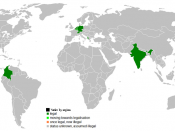Euthanasia, also mercy killing, practice of ending a life so as to release an individual from an incurable disease or intolerable suffering. The term is sometimes used generally to refer to an easy or painless death. Voluntary euthanasia involves a request by the dying patient or that person's legal representative. Passive or negative euthanasia involves not doing something to prevent death--that is, allowing someone to die; active or positive euthanasia involves taking deliberate action to cause a death.
Euthanasia has been accepted both legally and morally in various forms in many societies. In ancient Greece and Rome it was permissible in some situations to help others die.
With the rise of organized religion, euthanasia became morally and ethically abhorrent. Christianity, Judaism, and Islam all hold human life sacred and condemn euthanasia in any form.
Following traditional religious principles, Western laws have generally considered the act of helping someone to die a form of homicide subject to legal sanctions.
Even a passive withholding of help to prevent death has frequently been severely punished. Euthanasia, however, occurs secretly in all societies, including those in which it is held to be immoral and illegal.
The Ethics of Euthanasia
Organizations supporting the legalization of voluntary euthanasia were established in Great Britain in 1935 and in the United States in 1938. They have gained some public support, but so far they have been unable to achieve their goal in either nation. In the last few decades, Western laws against passive and voluntary euthanasia have slowly been eased, although serious moral and legal questions still exist.
Critics point to the so-called euthanasia committees in Nazi Germany that were empowered to condemn and execute anyone found to be a burden to the state. This instance of abuse of the power of life and death has...


